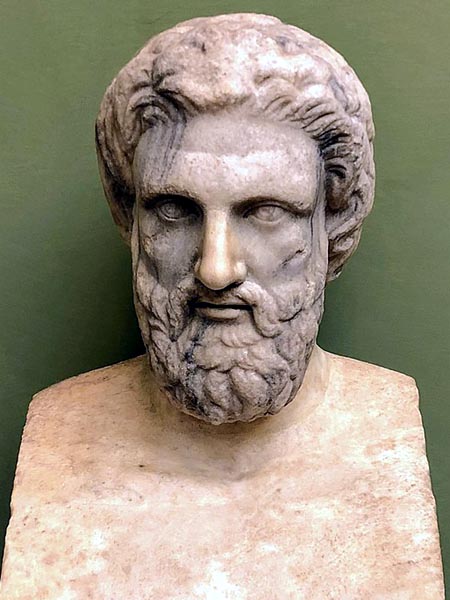 |
| Aristophanes (Wikipedia) |
Note: The Greeks are known for their tragedies on stage, but equally entertaining (and insightful) were their comedies, some of which were written by Aristophanes.
Get Ready: What kind of movies do you prefer, tragedies (often ending in death or separation), or comedies (those with "happy endings")?
Although he was a generation older than Aristotle (see Lesson #04-019), Aristophanes (c. 446-388 BCE) was closely connected to the philosopher, as we shall see. Famous as the "Father of Comedy," he built his career on ridiculing--some people even said slandering--the people and especially the leaders of Athens.
He probably wrote about 30 plays; eleven of them can still be read, mostly complete. Two of these remain well known, for very different reasons.
The Clouds was referred to in the trial of Socrates, as reported by Plato in The Apology. There, the philosopher suggests that part of the reason Socrates was accused and put on trial is that a "comic poet"--namely Aristophanes--had misrepresented Socrates' true teachings. He wrote that "Socrates is an evil-doer, and a curious person, who searches into things under the earth and in heaven, and he makes the worse appear the better cause; and he teaches the aforesaid doctrines to others."
It is true that Aristophanes had made the great philosopher look silly. Yet it seems that the two men were in fact very good friends. It is more likely that Socrates was executed for criticizing the leaders of Athens, than because a comedian criticized him! Remember that Socrates taught Plato, and Plato taught Aristotle. This is the link between the latter and Aristophanes.
The second play still famous among students is Lysistrata. The name means something like "cutting apart the army," and refers to an unusual strategy used by the women of Greece. Tired of the constant war between the various city states, the women from opposing sides joined together and agree to withhold sex from their men until they stop fighting. The play is an early look at the so-called "war between the sexes."
As these examples show, we can learn many things about ancient Greece from these plays. Although they were written for laughs, these two plays reflect the public's ideas both about philosophers, and about the relations between men and women. Aristophanes's other plays talk openly about political leaders, or examine the popular arts of the day. The comedies of Aristophanes were windows on the culture, just like the best comic productions of today.
--------Read more: https://en.wikipedia.org/wiki/Aristophanes
Practice: Match the term to its definition below:
- comedian
- comedy
- comic
- curious
- executed
- generation
- misrepresented
- ridiculing
- slandering
- withhold
- a play, movie, or speech that is funny
- a group of people born around the same time
- describes someone who wants to know many things
- an adjective meaning "funny"
- put to death
- speaking false, negative things about a person
- keep back, not give
- a person who writes or says funny things as a profession
- said untrue things about
- making fun of; causing to look silly
Answers are in the first comment below.
Submitted to the Shenzhen Daily for May 21, 2015


Answers to the Practice: 1. h; 2. a; 3. d; 4. c; 5. e; 6. b; 7. i; 8. j; 9. f; 10. g
ReplyDelete